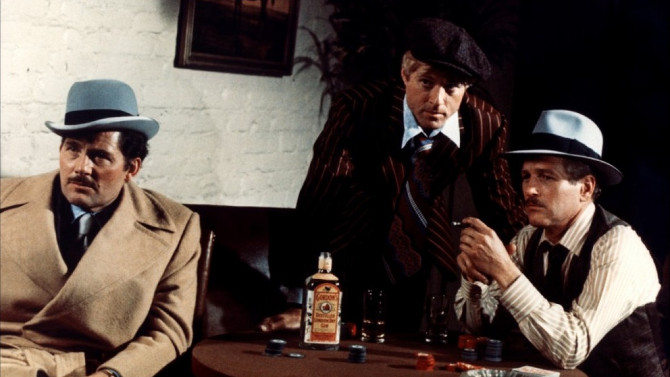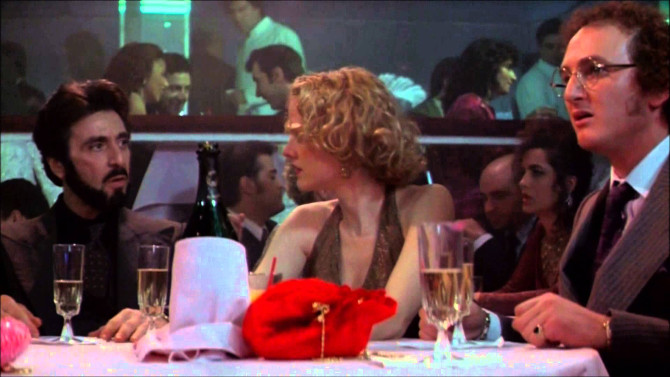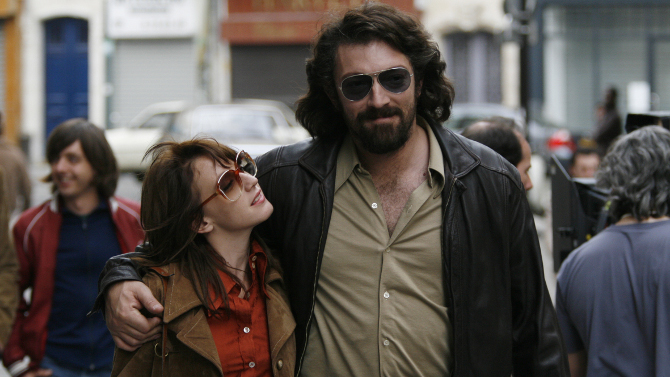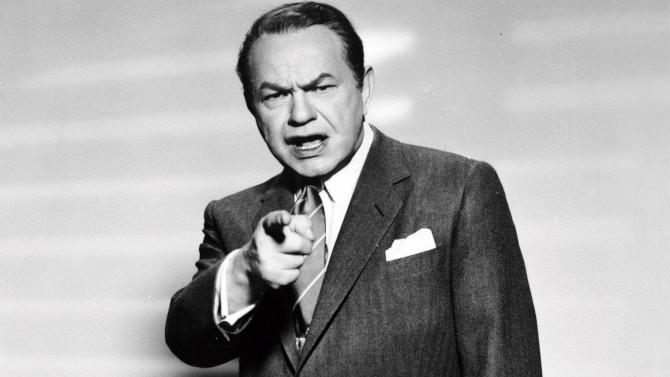
A Law Unto Themselves
The front door to an apartment swings open... an unseen figure walks through the living area and approaches a beautiful blonde woman wearing a robe as she walks around the bathroom... he then deliberately empties the barrel of his revolver into her – this is the jarring cold opening to the film noir Illegal (1955), and one thing is for sure, it knows how to grab your attention. Funnily enough, this was the third adaptation of the 1929 play “The Mouthpiece” by Frank J. Collins, following Mouthpiece (1932) and The Man Who Talked Too Much (1940) – and they say movies are remade too much today. Flash to Victor Scott (Edward G. Robinson), a district attorney who is wise to all the angles and is graced with a silver tongue. With an unyielding desire to win (he got it from growing up and fighting his way out of the slums), he argues every case like it is his last.
-
Star Pick with David Ebeltoft
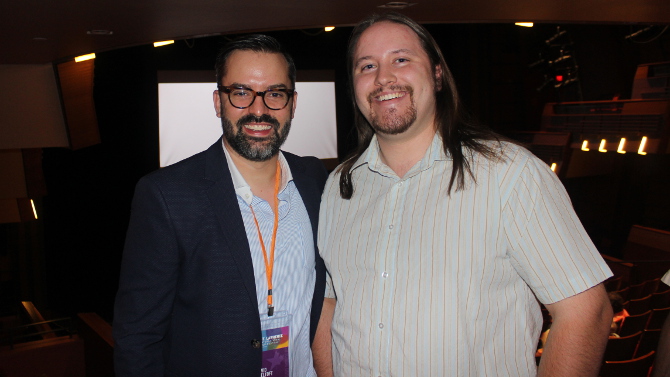 A Buzzworthy ProductionThe StingApril 18, 2017
A Buzzworthy ProductionThe StingApril 18, 2017Whether you’ve seen The Sting or not, it is nearly impossible not to recognize its main theme, titled "The Entertainer". A feel good, catchy, ragtime tune that is heard on and off from very beginning to utter end, it is Marvin Hamlisch’s reworking of the 1902 song by Scott Joplin that adds an auditory flair to the piece. It is this classic cinematic work that screenwriter David Ebeltoft, scribe of the Tribeca Audience Award Winner Here Alone, highlights as being his favourite. An up and coming writer in the business, his union with director Rod Blackhurst and producer Noah Lang (who was featured in last week’s Star Pick) seems like it is going to be a fruitful one, as the film making team have already announced two more features, You Were Once Called Queen City and North, following their first united effort – which has just been released and is doing very well in both theatres and online.
-
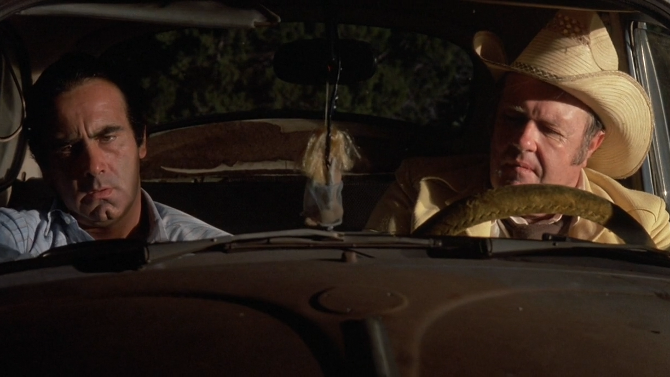
Blood Simple. . . Anything But
Blood Simple.February 3, 2017With two feet firmly planted in the historic noir genre of the 1940s and 50s, Joel and Ethan Coen went about making their first feature film, Blood Simple.. Though it was not, by any means, that ‘simple’. Creating a trailer long before production (it has Bruce Campbell in it – who never appears in the final motion picture), strangely enough, it does not feel entirely compatible with their final product, but somewhat like a distant relation to the iconic cult horror classic Evil Dead. On the advice of Sam Raimi (director of the above mentioned movie – who helped advise the brothers), the Coen’s went door to door with a projector and their trailer, seeking out investors. Think of it as the original GoFundMe. In just over a year, they raised the needed capital and got to work on their film – which, in case you thought that I made a mistake up above, contains a period after ‘Simple.’. A striking neo-noir, the title comes from an old Dashiell Hammett novel, "Red Harvest", a term that highlights the muddled, jittery and anxious mindset of people who have had a protracted immersion in violent affairs.
-
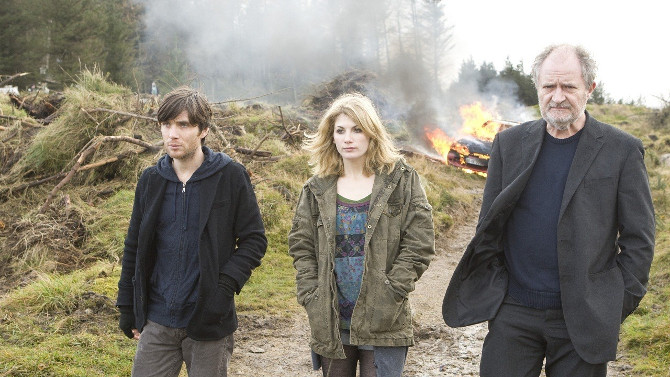
Perrier a Worthwhile Bounty for Audiences
Perrier's BountyDecember 11, 2016Narrated by the Grim Reaper (Gabriel Byrne), 2009's Perrier’s Bounty is an intriguing Irish film that mixes action and comedy within a crime story (all centred around a complex father/son relationship). Written by Mark O’Rowe (who also scribed the entertaining 2003 flick Intermission) and directed by Ian Fitzgibbon, they thrust us into the life of protagonist Michael McCrea (Cilian Murphy), a flawed, complicated figure who just happens to be sleeping in the afternoon while two thugs, Ivan (Michael McElhatton – Roose Bolton in Game of Thrones) and Orlando (Don Wycherley), sit on his couch eating his pistachios. Henchmen to a dangerous gangster, Darren Perrier (Brendan Gleeson), the duo remind the recently woken man that he owes the crime boss a hefty sum that must be paid in four short hours. Surrounded by an ever-complicated life, his female best friend Brenda (Jodie Whittaker), who lives one floor down, is struggling with her longtime boyfriend Shamie (Pádraic Delaney), while his father Jim (Jim Broadbent) arrives out of the blue and states that he is dying of cancer – the two have not spoken in some four years. Pushing them to the periphery while he deals with the more pressing problem of Perrier, he reaches out to a local drug dealer, Clifford (Domhnall Gleeson), as the man knows every low life in the city of Dublin. Getting directions to The Mull (Liam Cunningham – Davos Seaworth in Game of Thrones), a loan shark, he petitions him for some cash. Having none of it, instead, The Mull invites him to partake in a criminal venture with his buddy Dinny (Breffni McKenna), and Michael, desperate for any solution, agrees.
-
Star Pick with Christian de la Cortina
 Show Me the WayCarlito's WayDecember 6, 2016
Show Me the WayCarlito's WayDecember 6, 2016Following the special screening of the Canadian independent film Generation Wolf at the historic Port Theatre in Cornwall, Ontario, I sat down with filmmaker Christian de la Cortina – who co-wrote, produced, directed and starred in the entertaining crime flick. Cortina, who works out of Quebec, has had a fruitful start to his career, dabbling in many French language television series and miniseries, including La Marraine, 19-2, Mon Ex à Moi and O’, as well as procuring roles in American productions being filmed in La Belle Province, including last year’s highly touted Academy Award nominee Brooklyn. 2008 was a watershed year for the man, as he released his first feature film – Transit, which he also produced, directed, wrote and starred in. Seeing it as an opportunity to concoct intriguing roles for himself and others (as he did not want to be placed in a position where he may only receive similar roles throughout his career – in other words, typecast), Generation Wolf can be seen as a successful extension of that plan – as it depicts an engaging story that is chock full of richly drawn characters.
-
Mais Oui, Crime Spree!
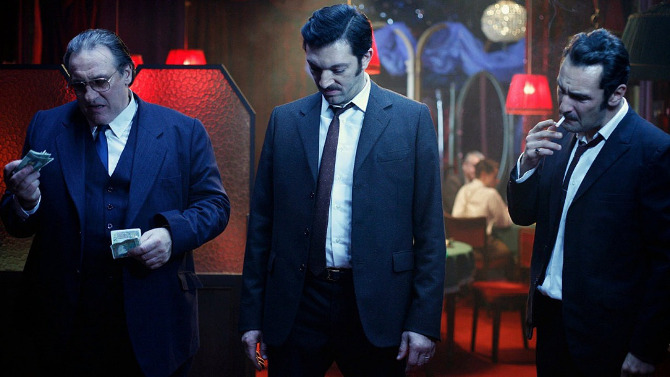 Mesrine Part 1: Killer InstinctMesrine Part 2: Public Enemy #1December 4, 2016
Mesrine Part 1: Killer InstinctMesrine Part 2: Public Enemy #1December 4, 2016A two part feature, Jean-François Richet’s action crime films Mesrine Part 1: Killer Instinct and Mesrine Part 2: Enemy #1 are best watched when paired together. That is why I am utilizing my dual review feature to discuss both here today. Together, running a little over four hours, the story looks at the life of real life figure Jacques Mesrine (Vincent Cassel) – brought to vivid life by the talented French actor, who is able to capture the man’s charm and Robin Hood (thief) appeal, as well as the scary side that bubbles just below the surface. From its very onset, we are drawn into the suspense-filled tale, as Richet utilizes a split screen effect (and sometimes more) to ratchet up the ominous foreboding. Resembling something from a Brian De Palma flick, it is an effective way to have us looking over our shoulder for some unknown threat. By the end of the sequence, we know the fate of our elusive figure and are transported back to learn the entire sordid tale. Part 1 spans the years 1959-1972.
-
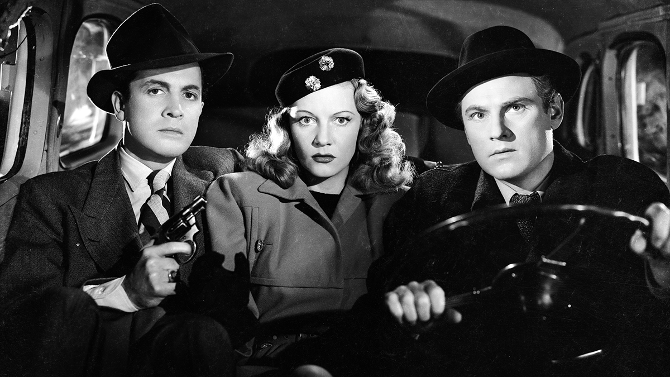
Confessions of a Fatal Femme
DecoyNovember 30, 2016Taking the rare angle of having the femme fatale be the voice-over narrator, the 1946 film noir Decoy, directed by Jack Bernhard, does a lot with the little budget it had. Perhaps the most brutal dame of them all, Margot Shelby (Jean Gillie) is shot at the very beginning of the story, wounded by a then unknown assailant. It is at this point that she recounts her sordid tale. Honey to a rough and tumble aging gangster, Frankie Olins (Robert Armstrong), the man has been placed behind bars following a robbery – which left a guard dead and the thief four hundred thousand dollars richer (which he hid before he got caught). Soon to be sent to the gas chamber, he still has hope that his girl, along with a gangster associate, Jim Vincent (Edward Norris), will find a way to help him escape his doomed fate. Vincent, already short tens of thousands in aiding his fellow hoodlum, is not eager to throw more dough his way.

